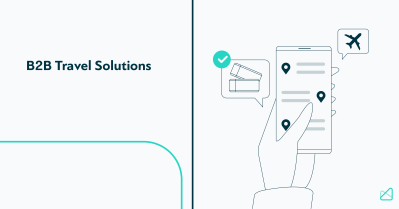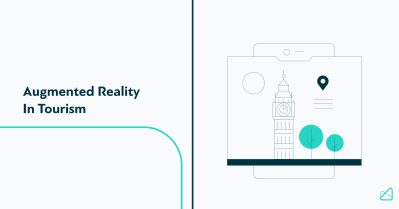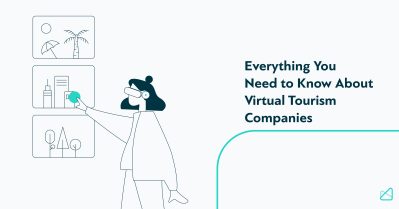4 Well-Thought Examples of Virtual Reality in Tourism

Technology has been driving progress in the tourism sector for quite a while now. We’ve seen everything ranging from IoT sensors to sophisticated software implemented throughout the entire landscape.
Technology helps companies remain competitive in an increasingly saturated tourism market. The latest addition to the tourism tech stack is virtual reality or simply VR.
Since this is a brand new tech, it’s understandable that you have some reservations about it. However, some of your competitors are already harnessing the powers of VR. Are you aware of the potential that this tech carries? Before we see how they use it, let’s see what it is and what benefits it can offer.
What is virtual reality in tourism?
Virtual reality in tourism stands for all the use cases of VR tech. VR tech includes:
- VR headsets;
- VR glasses;
- 360-degree cameras;
- Video editing software;
- Special microphones for recording immersive sounds.
Thanks to all these tools, the tourism sector can easily leverage VR.
Using the latest technology, travel agencies, hotels, and other businesses in the sector can create and deliver easy-to-consume immersive experiences. Let’s see how virtual reality is used in tourism.
How is virtual reality used in tourism?
All VR use cases in tourism can be characterized as marketing efforts. Why? Because tourism primarily uses VR for 3D virtual tours of tourist attractions, hotels, and resorts. VR deliverables proved excellent resources to use in the initial phases of the customer buying cycle.
Companies in the tourism sector have figured out that VR can facilitate the decision-making process for travelers. That’s why virtual tours have become so popular, and one of the industry’s most common VR use cases.
Next, we have 360-degree VR images easily shareable across social media. They are also a fantastic VR piece of content to use.
To sum up, VR in tourism helps:
- Create VR travel experiences;
- Create interactive content for websites and social media;
- Create VR hotel and tourist attraction tours.
Why bother and use VR in the first place when you have all those effective marketing strategies for attracting clients? Before you make a final decision, consider the following benefits.
Benefits
The most notable benefits of virtual reality in tourism go as follows:
- Attract more visitors by enabling them to experience the destination firsthand before even booking it;
- Showcase realistic 360-degree views of any destination or hotel in high resolution;
- Mesmerize travelers by allowing them to explore destinations on their own from the convenience of their home;
- Improve brand image by delivering unique brand engagement;
- Gain competitive advantage by offering unique, unforgettable experiences;
- Helping travelers worldwide become more comfortable using VR to explore travel destinations.
Real-life examples
What better way to see VR in action than through real-world examples? Here are several companies in the travel sector that implemented it successfully.
Thomas Cook Airlines: 360-degree VR tour
The problem
Thomas Cook Airlines in Manhattan operate in a very saturated market, offering helicopter flights over Manhattan. Since their bookings were dwindling, they decided to leverage VR.
The solution
The company aligned with a VR studio and created a VR tour using the actual 360-degree recordings of their helicopter flight.
The result
The result was outstanding. The bookings went up by a whopping 180% as VR helped the company stand out from the crowd and offer something unique to the travelers visiting the Big Apple.
Visit Wales: VR videos of dolphins
The problem
After noticing that their wildlife attractions were not getting the projected bookings, Visit Wales, a UK-based company, decided to use VR to bring wildlife attractions to potential visitors.
The solution
The travel company hired VR professionals to create VR videos of dolphins and kingfishers. The purpose of the videos was to get more people interested in booking wildlife attraction tours.
The result
The result was incredible. After publishing the VR videos, Visit Wales recorded a 60% increase in bookings.
Marriott: travel destinations VR headsets
The problem
In 2015, VR was a hot subject, with only a couple of names in the tourism sector willing to test it. Marriott is one of the pioneers of VR adoption. Two hotels, the New York Marriott and the London Marriott Park Lane, decided to enable their guests to use VR headsets in their rooms. The experiment lasted 24 hours.

The solution
They decided to equip guests with Samsung Gear VR headsets to enable them to travel to three unique destinations without even having to leave their rooms.
The result
Considering that the experiment lasted only 24 hours, the results were outstanding. The guests’ satisfaction rates went above 100%.
First Airlines – VR immersive travel experience
The problem
At last, let’s explore the unique use of VR tech in travel. First Airlines is a Tokyo-based company. However, it’s not a travel company but an entertainment company that offers virtual travel experiences. The company saw an opportunity to engage people unable to travel via plane and turned to VR.
The solution
First Airlines made a real-size maquette of an airplane and used VR to provide immersive travel experiences to travel enthusiasts short of either money or time.
By using real-life recordings, it offers full onboard service with flight attendants. Their “airplane” can accommodate 12 passengers at a time.
The result
The purpose of this venture was to capture capital by enabling avid travelers who are unable to travel to experience the next best thing – VR traveling through a reality headset. It generated a lot of interest in VR travel among travelers which means there is more room for VR implementation in the sector.
Conclusion
VR technology has a lot to offer to the tourism sector. As you can see, it has different use cases. While most of them lock it into the domain of marketing, you can use VR for entertainment and as an alternative for “real” travel beneficial to people with no money or time.
Subscribe to
our newsletter
Yay! You are now
subscribed to our
newsletter
Mize is the leading hotel booking optimization solution in the world. With over 170 partners using our fintech products, Mize creates new extra profit for the hotel booking industry using its fully automated proprietary technology and has generated hundreds of millions of dollars in revenue across its suite of products for its partners. Mize was founded in 2016 with its headquarters in Tel Aviv and offices worldwide.
Related Posts

Your Ultimate Guide to B2B Travel Solutions
17 min. You’ve probably noticed that B2B travel solutions play a vital role in the global B2B travel sector. We are talking about the market bound to reach the size of $4952.96 by 2028. That’s a CAGR Growth of 17.51%. No wonder leading B2B travel solutions process over 80.000 bookings and 14.000 searches a day. […]

5 Ways Augmented Reality is Enhancing the Tourism Experience
20 min. Augmented reality (AR) can truly transform the way people discover and explore new places. By combining physical exploration with digital elements, travelers are able to gain deeper insights into different cultures while making memories along the way. In today’s world, more and more travelers are turning to technology to add excitement and convenience […]

Everything You Need to Know About Virtual Tourism Companies
24 min. Virtual tourism refers to a specific tourism niche using technology that enables travelers to experience activities, locations, and destinations without leaving their homes. The types of virtual tours depend on the multimedia format offered to travelers. It can be anything ranging from still images, video, and audio to interactive virtual reality. The popularity […]
